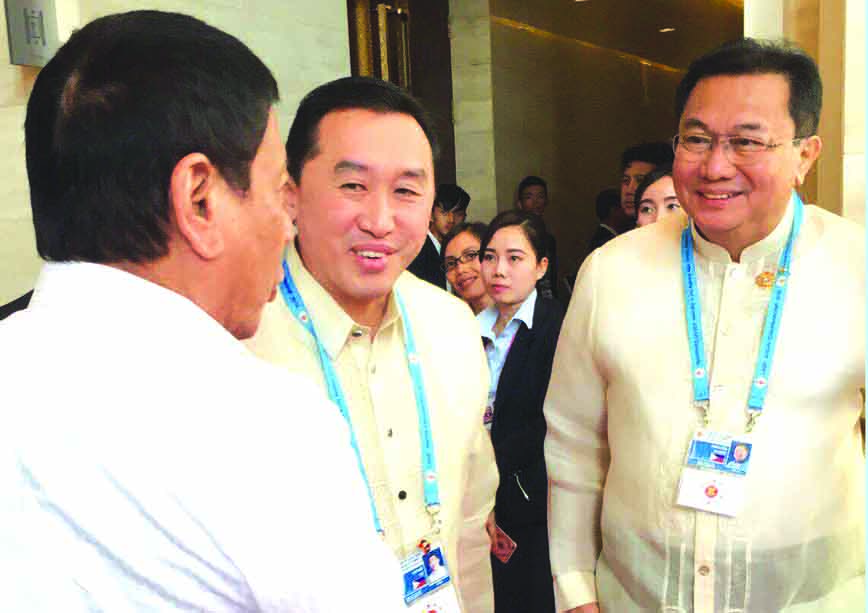
As an agricultural province, Bohol finds an apt representation, in the former agriculture secretary who now represents the third district, to the gathering of ASEAN leaders in the 28th and 29th ASEAN Summitswhich opened yesterday in Vientiane, the capital and largest city of Laos.
Third District Rep. Arthur Yap, chair of Economic Affairs Committee of the House of Representatives, joined the Philippine delegates to the 28th and 29th ASEAN Summits led by President Rodrigo Duterte.
With them are House Speaker Pantaleon Alvarez, Majority Floor Leader Rudy Fariñas, Minority Floor Leader Danilo Suarez, Bataan Rep. Jose Enrique Garcia III, House Energy Committee Chair Lord Alan Velasco, House Ways and Means Chair Dakila Cua, DFA Sec. Perfecto Yasay, DTI Secretary Ramon Lopez, is Defense Sec. Delfin Lorenzana, Sen. Alan Peter Cayetano, and other delegates.
and other delegates.
Yap also reunited with former Cabinet colleagues who also attended the Laos summit- -Gen. Hermogenes Esperon, Sec. Jess Dureza, DFA Asst. Sec. Mean Austria.
Yap’s committee takes charge of all matters relating to economic planning and programming; the planning of domestic and foreign public indebtedness; general economic development; and coordination, regulation and diversification of industry and investments.
ASEAN 2016 under the theme, “Turning Vision into Reality for a Dynamic ASEAN Communityâ€, gathers leaders of ten member states of the Association of SouthEast Asian Nations (ASEAN)- -Philippines, Brunei, Cambodia, Indonesia, Lao People’s Democratic Republic (PDR), Malaysia, Myanmar (Burma), Singapore, Thailand, and Vietnam.
Yap had been pushing measures to enable the Philippines to compete in the ASEAN integration.
One of the measures he passed is House Bill 36, proposing for the corporate tax reduction to do double lifts to the economy, especially with the ASEAN regional economic integration.
Aside from addressing concerns on the room for tax evasion, Yap pointed out that House Bill 36 is also “for the ASEAN regional economic integration in compliance with the ASEAN Economic Community (AEC) Blueprint to which the Philippines is a signatoryâ€.
Yap said the blueprint seeks to transform ASEAN into a single market starting December 2015, and “in order to be competitive under such new economic order, it is imperative that the Philippines reduces its high corporate tax rates and become attractive to foreign investmentsâ€.
House Bill 36, seeks “to lower corporate tax rates imposed on corporations by two percent per year for the next five years from its effectivity when the bill becomes a law, and settle at a flat rate of 20 percentâ€
Yap also said the Bill is primarily intended to remove the incentive for corporate taxpayers to resort to tax evasion and encourage them to voluntarily pay their tax liabilities, and to compete in funneling investors upon the ASEAN regional economic integration as well.
“Philippines is reputed to have the highest corporate tax rates in the ASEAN region at 30 percent. Currently, the average rate among the ASEAN countries is around 23 percent. Partly due to such high corporate tax rates, many corporations resort to tax evasion,†according to Yap.
Yap also proposed measures to uplift the capability and capacity of Filipino farmers, initially through the proposed free irrigation law and more government assistance for farm inputs.
He also filed House Bill 37 entitled, “An Act Establishing a Free Irrigation Program†for this.
Yap noted that even if “the rates of the NIA for the Irrigation Service Fees (ISF) are not very highâ€, but “it eats up on what otherwise would already be a small income for the farmer and their familiesâ€.
The ISF “is authorized to collect only up to an amount sufficient to cover the operation and maintenance of the irrigation system. It is not allowed to collect for the amounts to recover the cost of capital or the indebtedness for the construction of the irrigation projects. Nevertheless, the imposition of the ISF is a huge burden for the farmer beneficiariesâ€.
The burden laid on farmers leads them “to further shy away from farming and engage in other endeavorsâ€, he added.
If the farmers are left behind in the economic pace of the country, Philippines might hardly be able to compete against other ASEAN nations.
REGIONAL INTEGRATION
The ASEAN Summits pave for a venue for leaders of member states to consolidate efforts for regional integration.
At the opening of the 28th ASEAN Summit yesterday, the ASEAN heads of state or government “adopted the third Work Plan of the Initiative for ASEAN Integration (IAI Work Plan III)â€.
The five-year work plan is an integral part of the ASEAN 2025: Forging Ahead Together.
ASEAN leaders designed the work plan “to narrow the development gap, enhance the region’s competitiveness and support the implementation of the three Community Blueprints which ASEAN Leaders adopted in November last yearâ€.
“ASEAN leaders [also] adopted the Master Plan on ASEAN Connectivity 2025 (MPAC 2025)†during the opening of the summit yesterday.
“The MPAC 2025, which succeeds the Master Plan on ASEAN Connectivity 2010, focuses on five strategic areas: sustainable infrastructure, digital innovation, seamless logistics, regulatory excellence and people mobility. The MPAC 2025 was developed in consultation with relevant ASEAN Sectoral Bodies and other stakeholders. The remaining initiatives from MPAC 2010 were evaluated and incorporated in the MPAC 2025â€.
